Arsenal were denied a long-awaited victory at the Etihad Stadium, as another controversial refereeing decision overshadowed an incredible performance by the Gunners in their 2-2 draw against Manchester City.
Leandro Trossard‘s contentious sending-off for an alleged delay of the restart played a pivotal role in Arsenal being robbed of a win, with the image further down this page serves as damning evidence that Michael Oliver’s decision was unjust.
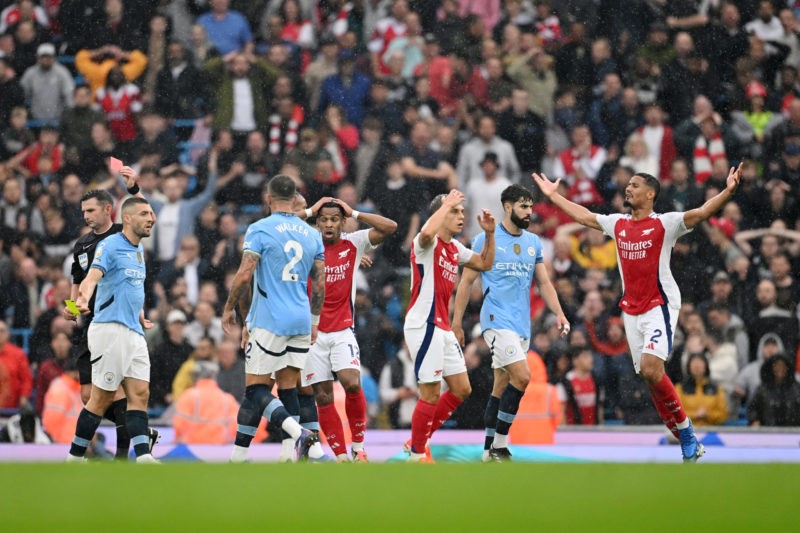
The game saw Arsenal come agonisingly close to securing their first victory at the Etihad since 2015, with Mikel Arteta’s men battling valiantly with 10 players for the entire second half.
Erling Haaland had handed City an early lead in the ninth minute, but Arsenal responded impressively. Riccardo Calafiori’s stunning Pireseqsue finish on his full debut levelled the score, and then Gabriel rose highest from a corner to give the Gunners a 2-1 advantage, humiliating Kyle Walker along the way.
However, the turning point came in the final second of the first half, when Trossard was shown a second yellow card for supposedly delaying the restart of play.
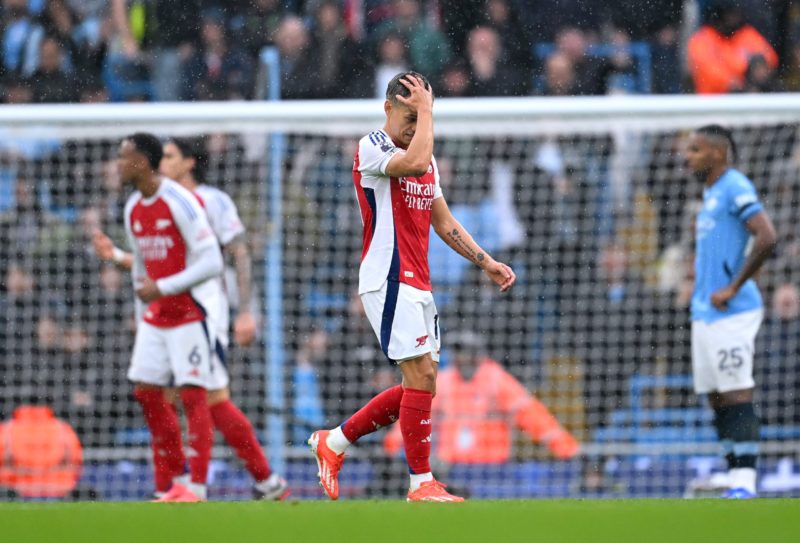
This decision left Arsenal with a numerical disadvantage for the entire second half, a situation that proved to be crucial in allowing City to mount relentless pressure.
John Stones’ injury-time equaliser denied the Gunners what would have been a memorable and hard-fought win.
Trossard’s dismissal: a questionable call
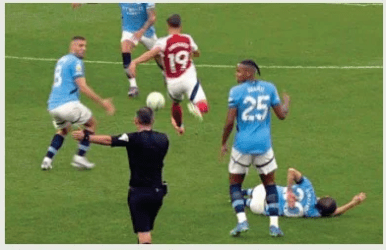
The image above paints a clear picture of the controversy. As seen, Trossard is in the motion of kicking the ball when referee Michael Oliver blew his whistle for a foul.
The Manchester City player was still lying on the ground clutching his back, and there was no imminent restart in sight that Trossard could have possibly delayed.
It was not a case of cynical time-wasting, as Oliver suggested, but rather an unfortunate timing issue that resulted in a second yellow card for the Belgian. Think van Persie at the Nou Camp, if you want yet another example of Arsenal being treated differently, and we now all have an idea of what was behind that decision.
In contrast, just a week earlier, Michael Oliver chose not to send off Liverpool‘s Dominik Szoboszlai for kicking the ball away while already on a yellow card, despite the same apparent offence.
On that occasion, the reasoning given was that it didn’t delay the restart. Kicking the ball away, in itself, is not the offence; it’s only punishable when it is a deliberate act to waste time, which Trossard’s action clearly was not.
Arsenal fans will of course remember Declan Rice being dismissed under similar circumstances against Brighton only a few weeks ago, but since then, there have been countless instances in other matches where such acts have gone unpunished.

Trossard’s dismissal was inconsistent, to put it mildly, with how similar incidents have been officiated across the league (and in this match) and questions need to be asked as to why.
Michael Oliver’s history with Arsenal
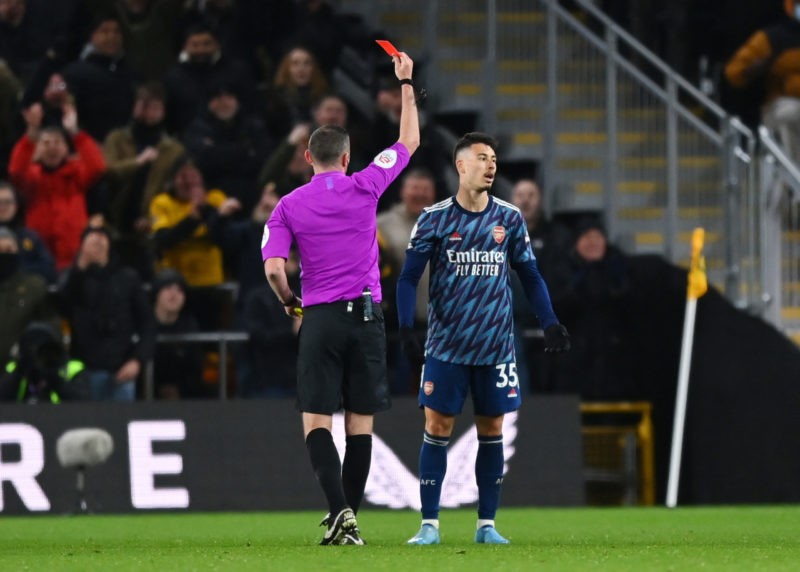
Michael Oliver’s history with Arsenal paints a worrying picture.
In 60 Arsenal games he’s officiated, Oliver has sent off seven Arsenal players while awarding the Gunners just five penalties.
By contrast, he has refereed 57 Manchester City games, sending off only one City player while awarding them 11 penalties.
The disparity is even more glaring when looking solely at Premier League matches: in 47 games involving Manchester City, Oliver has never shown a City player a red card but has awarded them 10 penalties.
For Arsenal, he has sent off six players in 52 Premier League matches, awarding them five penalties.
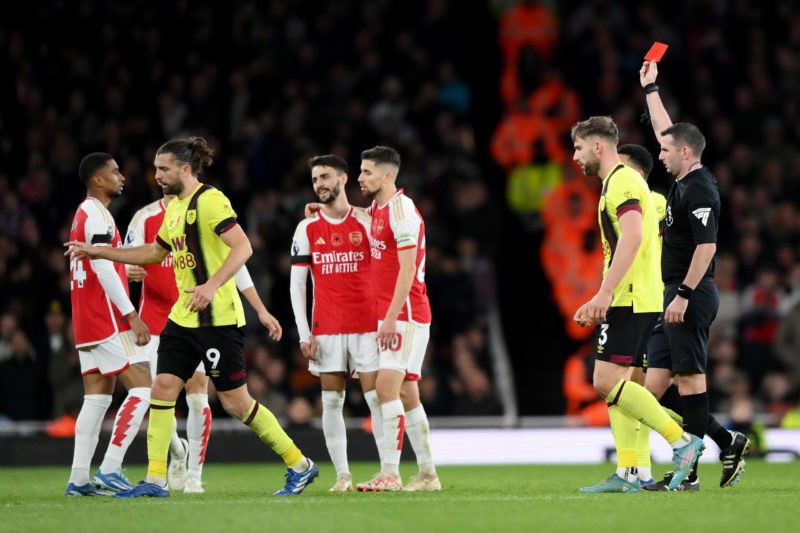
Let’s not forget that it was also Oliver who sent off Gabriel Martinelli for two yellow cards in the same phase of play without warning him that he was going to be booked for the first as he played advantage.
This inconsistency raises concerns about unconscious bias or, at the very least, a lack of impartiality in decision-making, especially when you consider the City owner paid Oliver £20,000 to referee a single game in Abu Dhabi. It may not be corruption but it is, at best, a bad look.
For Arsenal fans, the decision to send off Trossard felt like another chapter in a long history of contentious calls by Oliver against their club and yet another that went in Man City’s favour under the official.
Comparisons with past incidents
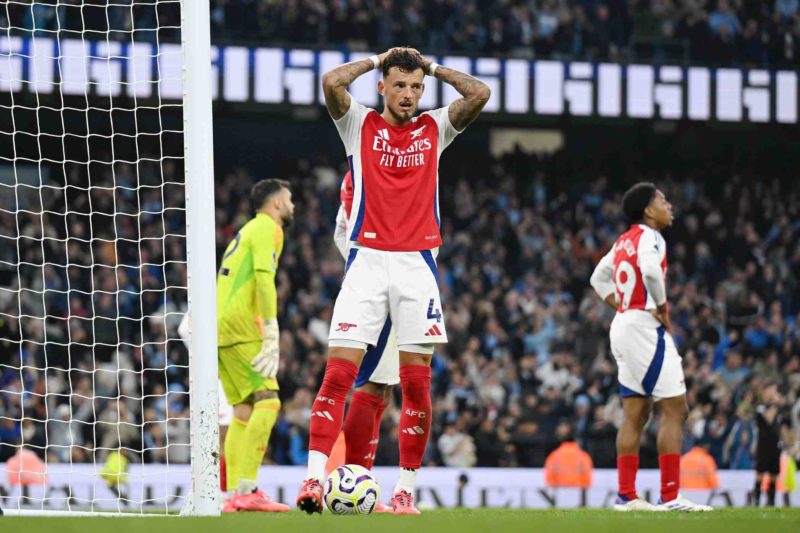
As if that isn’t enough, Manchester City’s (and the media’s) accusations of time-wasting by Arsenal are brought into question by the fact that Oliver added seven minutes of stoppage time at the end of the match (and played nine), even though the ball had been in play for 35 minutes – the highest amount for any match in the Premier League this season.
You will not see another match this season where almost exactly 45 minutes are played in a half. It raises questions about what exactly constitutes time-wasting and why such a severe punishment was meted out to Trossard and only Trossard.
Moreover, memories of Oliver’s leniency towards City in previous matches remain fresh. Last season, the same referee opted not to dismiss Mateo Kovacic despite two horrendous challenges in a match at The Emirates.
Howard Webb later justified the decision by claiming they did not want to have a “negative impact on the game.” That logic was evidently absent when deciding Trossard’s fate.
The inconsistency in Oliver’s decisions was infuriating. Haaland’s repeated rough challenges and his deliberate throw of the ball at Gabriel went unpunished, despite being clear examples of dissent and aggression.
Additionally, City players surrounded the referee frequently, with Ruben Dias at one point sprinting 50 metres to confront Oliver – behaviour that is often penalised for other teams.
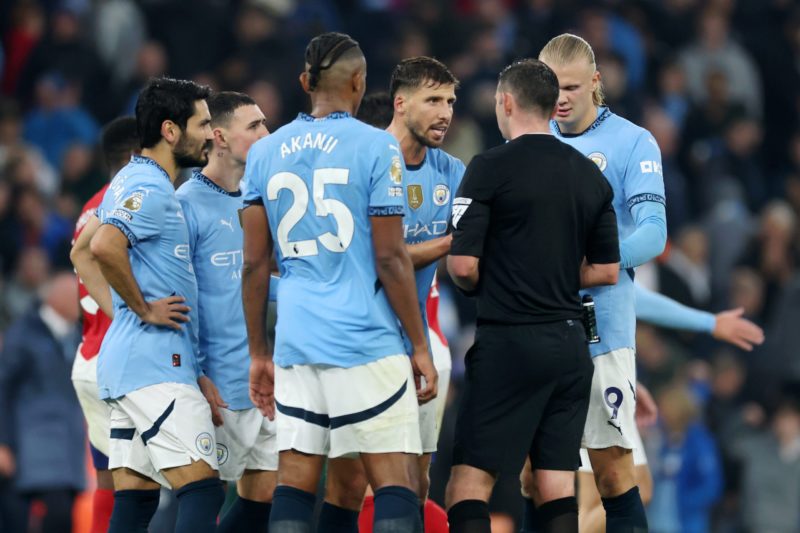
Then, you had Doku kicking the ball away but not getting booked while three Arsenal players (Trossard, Declan Rice, Gabriel Jesus) were booked for the offence that may or may not be an offence, depending on who is being refereed.
The narrative shift
For years, Arsenal have been labelled as “naïve” in big games, often criticised for not having the experience or the physicality to compete with top sides like Manchester City, Liverpool, Chelsea, and Manchester United.
Now, as they demonstrate their ability to hold their own, break goal-scoring records, and show resilience in matches like this, they are unfairly punished and branded as “time-wasters” and “dirty”.
![Michael Oliver’s red card decision dismantled 10 City taunt ‘dirty’ Arsenal Rivals accused of dark arts and belittled for lack of titles after dramatic draw with champions The Daily Telegraph23 Sep 2024By James Ducker NORTHERN FOOTBALL CORRESPONDENT at the Etihad Stadium John Stones and Bernardo Silva took a blistering swipe at “dirty” Arsenal’s dark arts and taunted them for their lack of trophies after their title rivalry exploded during a stormy clash at the Etihad Stadium. On a day of controversy and high drama, the 10 men of Arsenal came within seconds of becoming the first Premier League team to win at the Etihad for almost two years only for Stones’s 98th-minute equaliser to snatch a last-gasp 2-2 draw for the champions. Arsenal adopted an ultra-defensive approach in the second half after Leandro Trossard was shown a second yellow card on the cusp of half-time for kicking the ball away, to the fury of manager Mikel Arteta. City were left furious by what they felt were Arsenal’s time-wasting and deliberate attempts to disrupt the rhythm of the game by running down the clock. “There was only one team that came to play football,” said Bernardo, who was pictured making an “O” gesture with his hands, which could have been in reference to the trophies won by Arsenal. “The other came to play to the limits of what was possible to do and allowed by the referee, unfortunately. “The difference [between City’s rivalry with Arsenal and with Liverpool]? I don’t know. Maybe that Liverpool have already won a Premier League – Arsenal haven’t. That Liverpool have won a Champions League, Arsenal haven’t. “Liverpool always faced us faceto-face to try to win the games, so the games against Arsenal haven’t been like the ones we had and have against Liverpool. So, yes, maybe a different rivalry.” Stones said it was imperative City were not riled by Arsenal’s “dirty” tactics. “I don’t know if they [Arsenal] have mastered it [the ‘dark arts’ of football] – they’ve done it for a few years, and we know to expect that,” the City defender said. “You can call it clever, or dirty, whichever way you want to put it. “They break up the game, and obviously it upsets the rhythm for everyone. They use it for their advantage, and I thought we dealt with it really well. “It’s not easy when those things are happening, and you’re trying to gain momentum, you’re trying to get a foot in the game and get above them. Those little stoppages stop that, and I thought we dealt with it really well. “It was a difficult afternoon, I think for both teams – how they stopped the play, how they used the side of football that not many teams do, make it difficult, slow it down, get the keeper [David Raya] on the floor to get some information on. “We had to control our emotions during those times, and I felt that we did, and it was a good battle – a lot of tackles, some silly decisions.” Erling Haaland celebrated City’s equaliser by throwing the ball at Gabriel Magalhaes’s head after which a clash between the City striker and Arsenal defender sparked a melee. But Bernardo was frustrated the officials did not do more to punish perceived Arsenal time-wasting and dirty tricks and questioned the decision to allow their goals to stand. Kyle Walker was ordered over to speak to referee Michael Oliver and did not have time to recover his position before Arsenal took a freekick in the lead-up to Riccardo Calafiori’s equaliser, and Bernardo felt City goalkeeper Ederson was impeded for the second goal scored by Gabriel from a corner. Pep Guardiola said he lost count of the number of Arsenal players who “went down with cramp”. Asked about Arsenal’s time-wasting tactics, the City manager added: “Maybe I would have done the same because it is with 10 men.” Arteta was furious about the decision to dismiss Trossard – who had already been booked for pulling back Savinho – after Declan Rice had been sent off in similar circumstances for kicking the ball away against Brighton. Jeremy Doku escaped censure for kicking the ball away, although the City winger appeared to be kicking it towards the area he felt an Arsenal free-kick should be taken. “It’s the second time [this season],” Arteta said. “I’m expecting 100 Premier League games to be 10 against 11 or nine v 10 this season. Let’s see. It has already happened twice in five games which is very worrying to see.” Article Name:City taunt ‘dirty’ Arsenal Publication:The Daily Telegraph Author:By James Ducker NORTHERN FOOTBALL CORRESPONDENT at the Etihad Stadium Start Page:1 End Page:1](https://dailycannon.com/static/uploads/1/2024/09/240923-telegraph-sport-arsenal-dirty-e1727081007269.png)
Conclusion: a hard-fought point or a stolen victory?
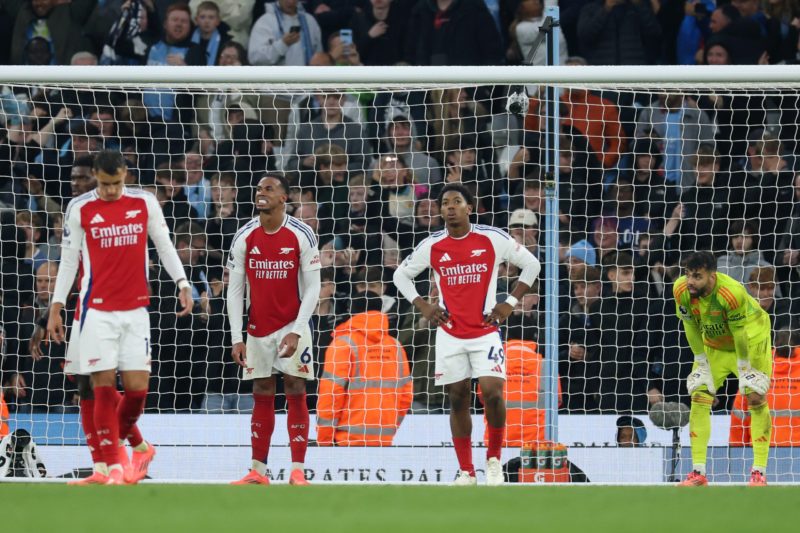
While Arsenal can take pride in their resilience and defensive strength, managing to hold off Manchester City for 45 minutes with just 10 men, the reality is that they were robbed of the win.
The image of Trossard in the motion of kicking the ball just as Oliver blew his whistle serves as indisputable proof that Arsenal were wronged on the day.
Instead of celebrating their first win at the Etihad in nearly a decade, they were forced to settle for a draw, with the sense of injustice palpable among players and fans alike, anger barely dissipating overnight.
If the Premier League is to maintain what’s left of its integrity, it needs consistency in refereeing decisions.
Arsenal’s performance warranted three points, but a questionable decision robbed them of the opportunity to claim a famous victory, leaving a bitter taste in the mouths of all associated with the club.
As the season progresses, Arsenal will hope that future decisions are made based on fairness and accuracy rather than inconsistency and perceived bias.
They know they won’t be. But they will hope, nonetheless.
